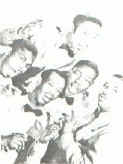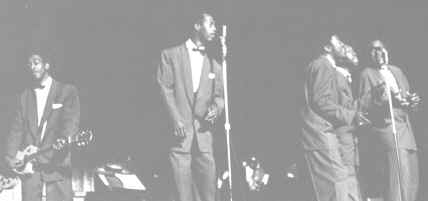

The "5 "Royales stayed with their gospel roots more than
almost any rhythm and blues vocal group. But, throughout their twenty year career, it was
the the influence of the courts, not the pulpit, that plagued the group
.![]()
The "5" Royales began as the Royal Suns in 1942, a locally popular gospel quintet based in Winston-Salem, North Carolina. The original members include brothers Lowman, Curtis and Clarence Pauling, along with William Samuels and Otto Jefferies.. In 1943 Jimmy Moore replaced Clarence Pauling just as the quintet was gaining a regional reputation in the Carolinas. By 1950 Obediah Carter and Johnny Tanner had replaced William Samuels and Curtis Pauling. In april 1952, the group sent a demo to Apollo Records, which had a fine reputation for its gospel records. Apollo was interested in the group, but not for gospel recordings. They were looking for a group that could compete with the Dominoes, the Orioles, and the Cardinals. The group was reluctant to change from gospel to secular music fearing alienating the religious community. It was at this time that they changed there name to the "5" Royales.
The first session at Apollo in 1952 produced "Too Much Of a Little Bit" and "Courage Of Love." 1953 saw there biggest hits "Baby Don't Do It" and "Help Me Somebody" both which topped the national rhythm and blues charts. Following this initial success, Otto Jefferies decided to stop touring and concentrate on being the groups manager. His place was taken by Eugene Tanner, though he continued to record with the group.
From 1952 through 1954, the "5" Royales were involved in several legal conflicts with another rhythm and blues group, the Royales, who recorded for King/Federal Records. First it was alleged that the Royales were making appearances billing themselves as the "5" Royales then, as the popularity of the Royales started to gain momentum, it was the "5" Royales were on the defensive. To make matters more confusing, the "5" Royales were at that time were negotiating to switch labels to King Records. Everything was smoothed over by mid-1954 when the Royales changed their name to the Midnighters, but in August problems between the "5" Royales and Apollo Records found Lowman Pauling in court suing for back royalties.

The group that recorded for King consisted of Lowman Pauling (bass), Johnny and Eugene Tanner (alternate lead tenors), and Jimmy Moore, Obediah Carter, and Oto Jefferies (harmony). Add to the mixture Paulings guitar licks in a call and response fashion that mimicked the gospel style, and the "5" Royales were a natural combination, sure to please.
The years on the gospel circuit had been a fine training ground. Johnny Tanner's strong lead vocals expressed an over powering conviction, and their singles retain the feel of revival night in a small Black Church in the Deep South. in fact, following there switch from gospel to secular music they recorded a number of singles on Apollo's gospel series. Among them were "Bedside Of A Neighbor" and "Journey's End." It was at King that they found there widest audience with "Think' in 1957 and "Dedicated To The One I Love." The latter was written by Lowman Pauling, who wrote most of the material for the group. This song would be an even bigger hit for the Shirelles and then for the Mamas and the Papas.
In 1960, the "5" Royales were involved in another lawsuit with fellow King artist James Brown concerning the song "Think." The lawsuit forced them to leave King, and for a time they recorded for Home Of the Blues in Memphis, which leased the masters to Vee-Jay and ABC Records. When the group disbanded in 1964 they had recorded over a hundred songs.
More than most other rhythm and blues vocal groups, the sound of the "5" Royales never completely divested itself of its gospel background. This in turn opened the door for other Black artists to sing the lyrics of rhythm and blues with the open feelings of gospel. This crossover of styles had a monumental impact on such artists as Clyde McPhatter of the Drifters, Hank Ballard of the Royales/Midnighters, and James Brown.